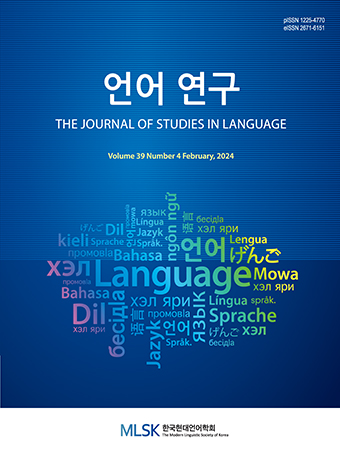Research Article
Abstract
References
Information
The previous studies on English compound words are operated syntactically and semantically, focusing on the headness and semantic relations between English compounds’ constituents.. In Relevance theory, however, the inference of lexical meanings also has the same process as the general communication process. It should be interpreted based on the contextual information. Flexible lexical inference such as narrowing, loosening, and metaphoical extension is necessary to make the inference process efficient. In this paper, the metaphor or metonym is not treated as a separate category but inferential process. The meaning of the constituents and the contextual information are integrated conceptually through the interential process and then finally constructed through the ad hoc concept.
- 석종환. 2011. 영어합성어의 분류. 『현대영미어문학』 29, 105-126. 10.5771/0175-274x-2011-2-126
- 양정연. 2020. 관련성 이론에 의한 영어 광고 분석. 충남대학교박사학위논문.
- Bagasheva, A. 2011. Compound Verbs in English Revisited. Bucharest Working Papers in Linguistics 1, 125-151.
- Barsalou, L. 1987. The Instability of Graded Structure in Concepts. In Neisser, U. (ed.), Concepts and Conceptual Development: Encological and Intellectual Factors in Categorization. Cambridge: Cambridge University Press, 101-140.
- Bauer, L. 2001. Compounding. In Haspelmath, M. et al. (ed.) Language Typology and Language Universals. New York: Walter de Gruyter, 695-707.
- Benczes, R. 2006. Creative Compounding in English: The Semantics of Metaphorical and Metonymical Noun-Noun Combinations. Amsterdam: John Benjamins. 10.1075/hcp.19
- Bloomfiled, L. 1993. Language. Chicago: The University of Chicago Press.
- Carston, R. 2002. Metaphor, Ad hoc Concepts and Word Meaning–More Questions than Answers. UCL Working Papers in Linguistics 14, 83-105.
- Carston, R. 2010. Lexical Pragmatics, Ad hoc Concepts and Metaphor: A Relevance Theory Perspective. Italian Journal of Linguistics 22, 157-180.
- Carston, R. 2019. Ad hoc Concepts, Polysemy and the Lexicon. Cambridge: Cambridge University Press. 10.1017/9781108290593.014
- Elly, I. 2009. Newspaper Headlines and Relevance: Ad hoc Concepts in Ad hoc Contexts. Journal of Pragmatics 41, 699-720. 10.1016/j.pragma.2008.10.016
- Glucksberg, S., Manfredi, D., and McGlone, M. S. 1997. Metaphor Comprehension: How metaphors create new categories. Creative Thought: An investigation of conceptual structures and process. 327-350. 10.1037/10227-013
- Grice, H. P. 1975. Logic and conversation. In P. Cole ans J. Morgan (eds.), Syntax and Semantics Vol. 3: Speech Acts. New York: Academic Press, 41-58. 10.1163/9789004368811_003
- Libben, G., Gibson M., and Sandra D. 2003. Compound fracture: The role of semantic transparency and morphological headness. Brain and Language 84, 26-43. 10.1016/S0093-934X(02)00520-5
- Lieber, R. 2005. English Word-formation Processes. In Stekauer, P. and Lieber, R.(eds.), Handbook of Word-Formation. Netherlands: Springe. 353-373. 10.1007/1-4020-3596-9_16
- Mioduszewska, E. 2017. Relevance, Ad hoc Concepts and Analogy. Linguistics Beyond and Within 3, 155-168. 10.31743/lingbaw.5656
- Recanati, F. 2004. What is Said and the Semantics/Pragmatics Distintion. In C. Bianchi (ed.), The Semantics/Pragmatics Distinction. Stanford: CSLI Publications, Stanford University, 45-64.
- Scalise, S. and A. Bisetto. 2011. The classification of compounds. In R. Lieber and P. Stekauer(ed.), Oxford Handbook of Compounding. Oxford: Oxford University Press. 34-53. 10.1093/oxfordhb/9780199695720.013.0003
- Sperber, D. and D. Wilson. 1986. Relevance. Language and Cognition. Oxford: Blackwell.
- Sperber, D. and Wilson, D. 2004. Experimental Pragmatics. Basingstoke: Palgrave Macmillan.
- Williams, E. 1981. On the “Notions Lexically Related” and “Head of a Word”. Linguistic Inquiry 12.2, 245-274.
- Wilson D. and R. Carston. 2007. A Unitary Approach to Lexical Pragmatics: Relevance, Inference and Ad Hoc Concepts. In: N. Burton-Roberts(ed.), Pragmatics. Basingstoke: Palgrave Macmillan, 230-259. 10.1057/978-1-349-73908-0_12
- Wilson, D. and D. Sperber. 2004. Relevance theory. In Horn, L. and Ward, G. (ed.), Handbook of Pragmatics. Oxford: Blackwell. 607-632.
- Publisher :The Modern Linguistic Society of Korea
- Publisher(Ko) :한국현대언어학회
- Journal Title :The Journal of Studies in Language
- Journal Title(Ko) :언어연구
- Volume : 36
- No :3
- Pages :315-327
- DOI :https://doi.org/10.18627/jslg.36.3.202011.315




 The Journal of Studies in Language
The Journal of Studies in Language






